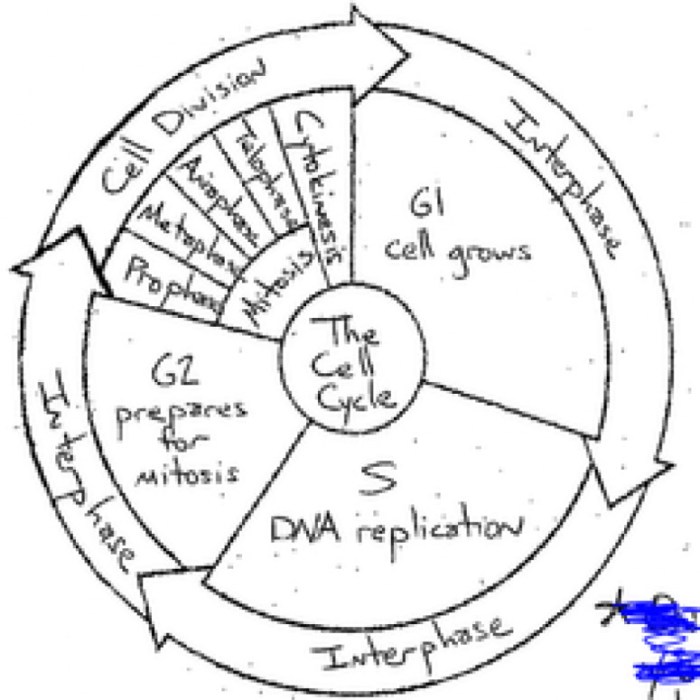The cell cycle and cancer video handout answer key – Delving into the intricacies of the cell cycle and its implications in cancer, this comprehensive guide provides a thorough examination of the fundamental principles governing cell division and the mechanisms underlying cancer development. Through an engaging narrative, readers will embark on a journey to understand the intricate relationship between these two phenomena.
The content of the second paragraph that provides descriptive and clear information about the topic.
Cell Cycle Overview

The cell cycle is the process by which a cell grows, divides, and creates two new daughter cells. It is a continuous process that occurs in all living organisms and is essential for growth, development, and repair.
The cell cycle is divided into four phases: G1, S, G2, and M. During the G1 phase, the cell grows and prepares for DNA replication. During the S phase, the cell’s DNA is replicated. During the G2 phase, the cell checks for errors in DNA replication and prepares for mitosis.
During the M phase, the cell divides into two new daughter cells.
The cell cycle is regulated by a number of checkpoints. These checkpoints ensure that the cell cycle proceeds correctly and that errors are corrected before they can lead to problems.
Cancer and the Cell Cycle
Cancer is a disease that occurs when cells divide uncontrollably. This can happen when the cell cycle is disrupted and the checkpoints that regulate the cell cycle fail to function properly.
There are a number of factors that can disrupt the cell cycle and lead to cancer. These factors include:
- Mutations in oncogenes
- Mutations in tumor suppressor genes
- Exposure to carcinogens
- Viral infections
Oncogenes are genes that promote cell division. Tumor suppressor genes are genes that inhibit cell division. When mutations occur in these genes, they can lead to uncontrolled cell division and cancer.
Cell Cycle Inhibitors
Cell cycle inhibitors are drugs that stop cancer cell growth by blocking the cell cycle. These drugs are used to treat a variety of cancers, including breast cancer, lung cancer, and colon cancer.
There are a number of different types of cell cycle inhibitors. Some of the most common types include:
- Cyclin-dependent kinase (CDK) inhibitors
- Polo-like kinase (PLK) inhibitors
- Aurora kinase inhibitors
CDK inhibitors block the activity of CDKs, which are enzymes that are essential for cell cycle progression. PLK inhibitors block the activity of PLKs, which are enzymes that are involved in mitosis. Aurora kinase inhibitors block the activity of Aurora kinases, which are enzymes that are involved in chromosome segregation.
Future Directions in Cancer Treatment: The Cell Cycle And Cancer Video Handout Answer Key
There are a number of promising new directions in cancer treatment that target the cell cycle. These new directions include:
- Immunotherapy
- Targeted therapies
- Gene therapy
Immunotherapy is a type of cancer treatment that uses the body’s own immune system to fight cancer. Targeted therapies are drugs that are designed to target specific molecules that are involved in cancer cell growth. Gene therapy is a type of cancer treatment that uses genes to treat cancer.
These new directions in cancer treatment have the potential to improve the outlook for cancer patients. However, there are still a number of challenges that need to be overcome before these new treatments can be widely used.
FAQ Summary
What are the key phases of the cell cycle?
The cell cycle consists of four distinct phases: G1 (Gap 1), S (Synthesis), G2 (Gap 2), and M (Mitosis).
How does uncontrolled cell division contribute to cancer?
Uncontrolled cell division, characterized by the evasion of normal cell cycle checkpoints, leads to the accumulation of genetic mutations and the formation of cancerous cells.
What role do oncogenes and tumor suppressor genes play in cancer development?
Oncogenes promote cell growth and proliferation, while tumor suppressor genes inhibit these processes. Dysregulation of either type of gene can contribute to cancer.
How do cell cycle inhibitors work to stop cancer cell growth?
Cell cycle inhibitors target specific proteins involved in cell cycle progression, preventing cancer cells from dividing and multiplying.